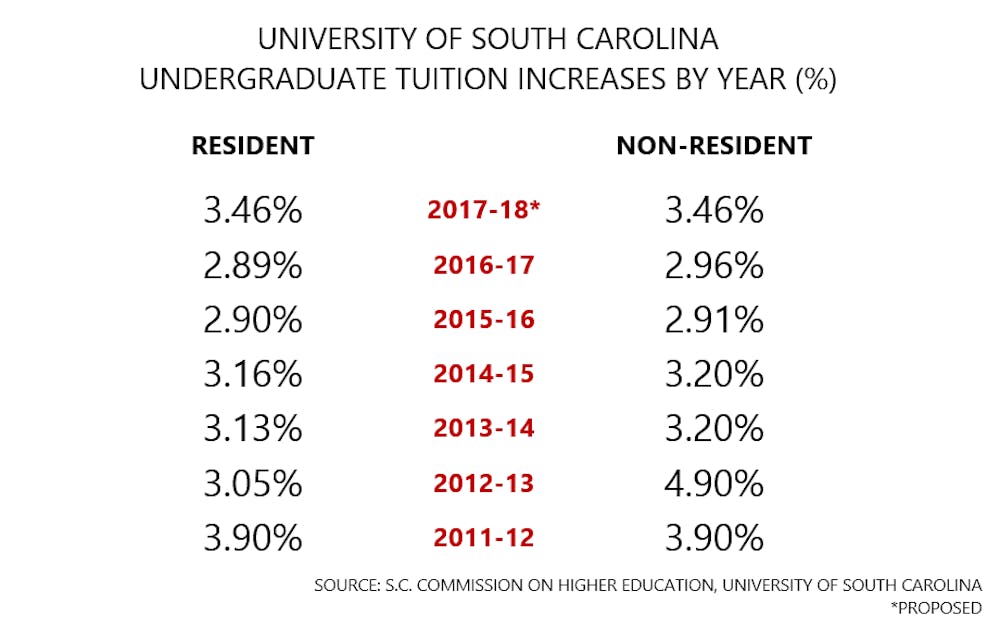The steepest tuition hike in years has been implemented into USC's 2017-18 budget following Friday's Board of Trustees meeting.
Unveiled in front of the board's Executive Committee Friday morning, the proposed 2017-18 operating budget called for a 3.46 percent increase of resident and non-resident undergraduate tuition for the coming academic year. After receiving the approval of the Executive Committee, the budget was voted on in the full meeting, originally scheduled for 11 a.m. Friday. When a vote was called, five members voted against.
The presentation brought before the Executive Committee named projected 2017-18 tuition figures as $6,131 per semester for resident undergraduates and $16,181 per semester for non-resident undergraduates, increases of $204 and $540 per semester, respectively. The tuition hike is projected to generate $12.9 million in new revenue for USC in 2017-18.
The hike will likely place USC as the third-most expensive public university in the state behind Winthrop University ($14,510 for in-state undergrads in 2016-17) and Clemson University ($14,318 in 2016-17) this fall. Winthrop and Clemson are both yet to confirm tuition rates for 2017-18.
USC has increased tuition every year since 1987.
Student body president Ross Lordo reacted promptly with a Friday afternoon statement in which he referred to the tuition hike's passage as a "difficult yet unavoidable decision" in the face of plummeting levels of funding from the Statehouse and ongoing construction projects, including a new student union on the USC campus.
"Now, more than ever in our 216-year history, the university will depend more on student-funding than state-funding," Lordo said. "The flagship institution for the state of South Carolina must rely on its students and parents to fill the financial void our state legislature has decided not to fund. As Carolinians, we must continue to lobby our representatives on behalf of all students – past, present and future."
A fee to pay for construction of a new student union was one of the platforms Lordo ran his campaign on this winter. According to his Friday statement, the fee is included in the 2017-18 tuition hike.
Student reaction to the hike has not been as warm as Lordo's, with most current Gamecocks lamenting yet another tuition increase and others wondering where the extra $12.9 million will go.
"Frankly, I’m always against paying more for something that I got at a cheaper price the year before,” said Ryan Davis, a third-year computer science student. “So if anything, I just want to know what’s changing to warrant yet another increase in tuition.”
Michael Vinzani, a second-year biology student, was similarly interested in where the new funding will go.
“If it’s all put to a necessary cause,” Vinzani said, “then the increase is needed. If it’s not then it’s denying individuals the opportunity to learn at a university.”
Anna Ripley, a fourth-year marine science student, was even less conciliatory.
"I think it's unfair for universities to continue to raise prices with a college education becoming a standard for many job requirements," Ripley said.
Further revenue will be generated through increases in academic unit fees for 2017-18, including a doubling of the Greek Village student fee to $250 and a tripling of the fee paid by first-year law students to $1,500.
Traditional housing plans will also be bumped up 3.9 percent to $2,665 per studentand USC satellite campuses in Aiken, Beaufort and Spartanburg will see a tuition increase of approximately 3 percent in the academic year to come.
Editor-in-chief Adam Orfinger contributed to this article.

